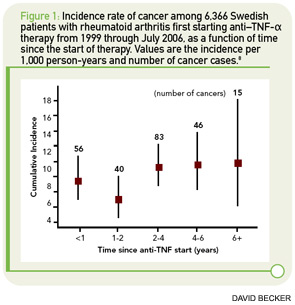Can we be sure that we do more good than harm when treating our inflammatory arthritis patients with biologic agents? This question may seem out of date today, but it was quite relevant 10 years ago following the introduction of tumor necrosis factor (TNF)–α inhibiting agents. However, worries and uncertainty persist today regarding specific risks of these medications, particularly malignancy risk. If nothing else, the name tumor necrosis factor ties this cytokine to malignancy and suggests vigilance in its long-term use.
Let us look back a decade, to when the first TNF inhibitors came onto the market. At that time, the rheumatologic societies of several European countries felt that it was their responsibility to monitor the long-term safety of patients treated with a class of “experimental” agents. This decision sparked the creation of a number of epidemiologic drug registries, which were sponsored by unconditional grants from the companies that produced the biologic agents. Inherently, this registry design was a new concept and a landmark for drug research. The registries were independent studies supported jointly by several companies; these companies were all competing for market share but had no say in the design, conduct, or publication of the resulting data. Using this type of study, it was possible to obtain vitally needed long-term safety data in a time when public money was not available or could not be guaranteed for the duration of these studies.
Why Be Concerned?
The use of TNF inhibitors in rheumatology traces back to the identification of TNF-α as a key player in the cytokine network and a master regulator of inflammation. Even earlier, however, this cytokine had been identified as the “serum factor that causes necrosis of tumors.” This activity led to its name, which has remained, although other cytokines are identified by other terminologies, such as interleukin-1. Carswell et al first isolated TNF in 1975.1 Their research was inspired by the work of William Coley who, 82 years prior, had described the phenomenon of rapid tumor regression when he treated patients with filtrates from bacterial cultures.2
The concern with using TNF inhibitors was driven by the fact that the inflammatory cascade was disrupted by these agents with unknown long-term effects. On the other hand, as evidenced by the extensive research into the role of TNF in tumor biology, it was (and still is) uncertain whether TNF has pro- or antiproliferative actions on cells in a way that can impact malignancy in the clinical setting.

